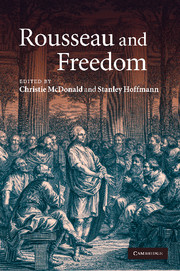Book contents
- Frontmatter
- Contents
- List of illustrations
- Notes on contributors
- Acknowledgments
- List of abbreviations
- Introduction
- PART I
- 1 Freeing man from sin: Rousseau on the natural condition of mankind
- 2 Making history natural in Rousseau's Discourse on the Origins of Inequality
- 3 Rousseau's Second Discourse: between Epicureanism and Stoicism
- 4 Jean-Jacques Rousseau and Diderot in the late 1740s: satire, friendship, and freedom
- 5 If you please! Theater, verisimilitude, and freedom in the Letter to d'Alembert
- 6 Music, the passions, and political freedom in Rousseau
- PART II
- PART III
- Bibliography
- Index
2 - Making history natural in Rousseau's Discourse on the Origins of Inequality
Published online by Cambridge University Press: 05 May 2010
- Frontmatter
- Contents
- List of illustrations
- Notes on contributors
- Acknowledgments
- List of abbreviations
- Introduction
- PART I
- 1 Freeing man from sin: Rousseau on the natural condition of mankind
- 2 Making history natural in Rousseau's Discourse on the Origins of Inequality
- 3 Rousseau's Second Discourse: between Epicureanism and Stoicism
- 4 Jean-Jacques Rousseau and Diderot in the late 1740s: satire, friendship, and freedom
- 5 If you please! Theater, verisimilitude, and freedom in the Letter to d'Alembert
- 6 Music, the passions, and political freedom in Rousseau
- PART II
- PART III
- Bibliography
- Index
Summary
As much as the Enlightenment has come to embody an age of rationalization and the rise of scientific thought for us today, an attentive reading of eighteenth-century texts signals their profound ambivalence toward emerging discourses of natural knowledge and the claims they made to know humans through physical qualities. The Abbé Raynal's Histoire des deux Indes voices such concerns:
Curiosities of nature are a fertile source for deceit; it converts singular phenomena into miracles. One country's natural history becomes supernatural in another. Facts, like plants, are altered when taken from their source: truths are transformed into errors.
Having fought to get away from a culture of wonders and marvels, Enlightenment thinkers sought to circumscribe a knowledge of the material world, but also articulated their unease toward the absoluteness of such expositions.
Before Rousseau voiced his own ambivalence about empirical evidence in his Discours sur l'origine et les fondements de l'inégalité (the Second Discourse), he began his study of the human by discarding his contemporaries' argument that social issues could be understood through the lens of a natural law arrived at through an a priori method. The Second Discourse takes issue with Thomas Hobbes, Hugo Grotius, and John Locke, among others, for constructing a skewed notion of the state of nature and claiming that it can explain the present. In his reassessment of the link between the state of nature and current social phenomena, Rousseau looked instead to conjectural history and to discourses of natural knowledge, including natural history, travel accounts, and inquiries into empirical particulars.
- Type
- Chapter
- Information
- Rousseau and Freedom , pp. 24 - 43Publisher: Cambridge University PressPrint publication year: 2010
- 1
- Cited by



